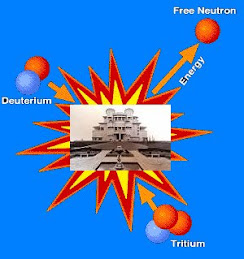Ditujukan untuk meningkatkan kualitas proses dan hasil perkuliahan Fisika di tingkat Universitas
14: Orbits and Escape Velocity
» Download this transcript (PDF)
If you are standing somewhere on Earth... this is the Earth, the mass of the Earth, radius of the Earth, and you're here.
And let's assume for simplicity that there's no atmosphere that could interfere with us, and I want to give you one huge kick, an enormous speed, so that you never, ever come back to Earth, that you escape the gravitational attraction of the Earth.
What should that speed be? Well, when you're standing here and you have that speed, your mechanical energy--
which we often simply call E, the total energy--
is the sum of your kinetic energy--
this is your mass; this is your escape velocity squared--
plus the potential energy, and the potential energy equals minus m Mg divided by the radius of the Earth.
So this is your kinetic energy and this is your potential energy--
always negative, as we discussed before.
Mechanical energy is conserved, because gravity is a conservative force.
So no matter where you are on your way to infinity, if you are at some distance r, that mechanical energy is the same.
And so this should also be one-half m v at a particular location r squared minus m M earth G divided by that little r.
And so at infinity, when you get there--
little r is infinity, this is zero, potential energy at infinity is zero--
and if I get U at infinity with zero kinetic energy, then this term is also zero.
And that's the minimum amount of energy that I would require to get you to infinity and to have you escape the gravitational pull of the Earth.
If I give you a higher speed, well, then, you end up at infinity with a little bit net kinetic energy, so the most efficient way that I can do that is to make this also zero, so you reach infinity at zero speed.
So this is for r goes to infinity.
Terima Kasih Semoga Bermanfaat dan mohon Maaf apabila ada kesalahan.





Tidak ada komentar:
Posting Komentar